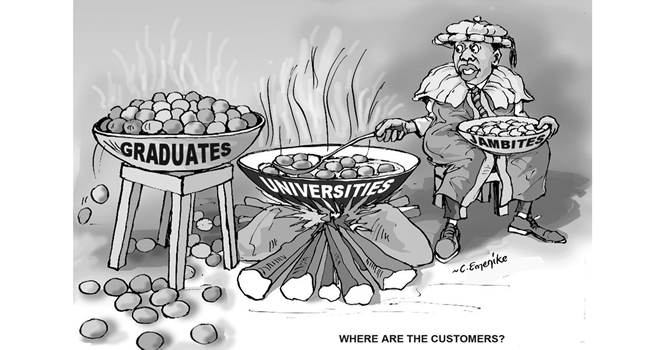
Again, the organised labour, the federal and state governments are at loggerheads over the new national minimum wage. The issue has been on the table in the last two years, with the Federal Government promising that it would institute a new minimum wage for workers across the country. Both sides of the divide have even gone as far as setting up a tripartite committee, aimed at reaching an agreement with labour on the matter. Labour had demanded N52,000 as the new minimum wage before the committee was set up.
But in the last two weeks, the discordant tunes coming out from all sides of the divide have become a serious concern.
While the Federal Government says no agreement has been reached with labour, the organised labour insists that a N30,000 agreement was reached. But the most terrifying angle is that of the state governors, who argue that they would be unable to pay a new minimum wage, even if it is the N20,000 touted by the Federal Government.
Minister of Labour and Employment, Dr. Chris Ngige, said there was no agreement yet on the negotiations for new minimum wage in the country.
Ngige said that the Federal Government was proposing a minimum wage of N24,000 for federal workers and N20,000 for the states.
The latest in the drama came from the governors, who met in Abuja Wednesday, last week, under the auspices of the Nigerian Governors’ Forum (NGF). They insisted that they would not be able to pay the new wage, considering that they are battling to pay the current N18,000 wage. Of course, the argument of the state governors is that some states are currently owing backlogs of salaries from the N18,000 minimum wage. They believe that a new minimum wage now would be an additional burden to them.
NGF chairman, Governor Abdulaziz Yari, said: “We are not against any upward review of salaries… But the problem of state is the capacity to pay what is agreed.
“As we speak, we are struggling with N18,000. Some of the states are paying workers 35 per cent up, some 50 per cent and some state have salary arrears.”
But, President, Nigerian Labour Congress (NLC), Ayuba Wabba, has told the state governors to tell their workers about their inability to meet up with the new wage request.
We find the drama surrounding the wage issue as very embarrassing. We cannot understand why the issue is taking government such a long time to reach an agreement with the labour unions. Just a few weeks ago, the organised labour embarked on a three-day warning strike across the country to force government’s hand on the matter. They were cajoled into calling off the strike by government. It was hoped that there would be a quick resolution of the matter to avert another round of crisis.
We are concerned that with the latest back and forth movement by both the states and Federal Government, it is a matter of time before Nigeria would witness another crippling strike.
Already, the organised labour has threatened to embark on a nationwide strike on November 6, declaring October 30 as national day of mourning and outrage.
We find it difficult to believe that either the Federal Government or states cannot afford to pay a new minimum wage, be it N20,000, N24,000 or N30,000. We refuse to accept the arguments of paucity of funds being peddled by government.
Rather, we believe that with more prudence, care and seriousness, governments at various levels would not find it hard paying the workers’ wages that could make some meaning in their lives.
The demands of labour, going by the current realities of economic downturn, inflation and the general outlook of the Nigerian worker are not out of place.
For the state governors, we are also aware that the Federal Government has since President Muhammadu Buhari assumed office, given bailouts and refund of Paris Club debt to most, if not all states. The monies were released with the hope that they would offset the salary burden hanging on their necks. We believe that any state government that still owe salaries by now, does so at its volition.
Beyond that, the over reliance on allocations from Abuja has become an albatross for the governors. With the exception of states such as Lagos, Rivers, Delta and Ogun, most other states seem to rely so much on the allocations that they have lost the initiative on critical thinking and innovations to cater for the welfare of their people.
The record of internally generated revenue for some states tells the story better. We think that if state governors and the Federal Government shed some of their excesses, they would be able to pay workers their dues.
We strongly insist that government has no reason not to meet labour’s demand of N30,000, which we consider not even adequate, giving the realities on the ground. Most importantly, workers across the country are aware of the take-home pays of government officials, their appointees and hangers-on.
We therefore call on governments at the state and federal levels to resolve the minimum wage issue to save the country from another round of needless strike.
END

Be the first to comment